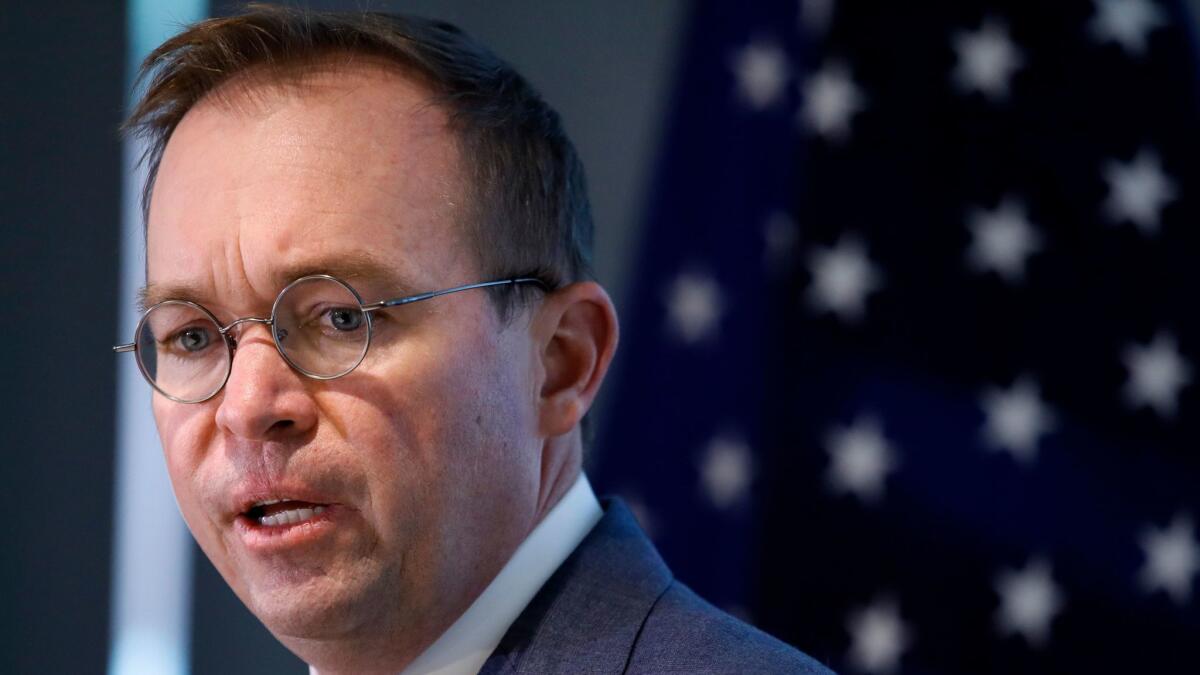Mick Mulvaney takes first step toward overhauling Consumer Financial Protection Bureau

Reporting from Washington — Mick Mulvaney once called the Consumer Financial Protection Bureau a “joke ... in a sad, sick kind of way.”
Now, as its acting director, he’s in a position to change it.
On Wednesday, Mulvaney announced he was launching a review of the entire operation of the consumer watchdog agency created in the wake of the 2008 financial crisis.
The bureau has provided Americans with billions of dollars in refunds and debt relief, often at banks’ expense. Republicans and many financial firms have complained that it has been too aggressive.
“In this New Year, and under new leadership, it is natural for the bureau to critically examine its policies and practices to ensure they align with the bureau’s statutory mandate,” said Mulvaney, a former Republican congressman who was appointed acting director by President Trump in November.
The bureau said it would formally request public input about whether it is “fulfilling its proper and appropriate functions to best protect consumers.”
It will seek comment on its enforcement of consumer protection laws, drafting of regulations, oversight of financial firms, monitoring of the marketplace and public education.
The first function to be examined: how the bureau demands information from financial firms during investigations.
“Much can be done to facilitate greater consumer choice and efficient markets, while vigorously enforcing consumer financial law in a way that guarantees due process,” said Mulvaney, who also serves as the White House budget director.
The announcement came the day after the bureau said it would consider revising or repealing regulations that were designed to protect consumers against harmful payday lenders. Most of those rules were slated to take effect next year.
Mulvaney took over as acting director after the bureau’s first leader, Richard Cordray, stepped down in November to pursue the Democratic nomination for governor of Ohio.
Trump’s appointment of Mulvaney, an outspoken critic of the bureau, was decried by Democrats and consumer advocates, who saw it as a signal Republicans planned to scale back the bureau’s operations. The appointment also is being challenged in court by Leandra English, the bureau deputy director who contends she is the rightful acting director.
Mulvaney’s review of bureau operations, which will let financial firms suggest changes, “is essentially like asking the fox in what order it would like to eat the hens,” said Karl Frisch, executive director of Allied Progress, a consumer watchdog group.
“It is a troubling move from a man who is clearly hell-bent on dismantling the agency he has been tasked with overseeing when he should be fulfilling its mission to protect consumers and hold bad financial actors accountable,” Frisch said.
The bureau was created by the Dodd-Frank Wall Street Reform and Consumer Protection Act to oversee credit cards, mortgages and other financial products.
The agency has provided consumers about $12 billion in refunds and debt relief from financial institutions since opening in 2011. It also played a key role in penalizing Wells Fargo & Co. for its creation of unauthorized accounts.
But Republicans and many financial firms have said the bureau has been too aggressive in enforcing consumer protection laws and drafting new regulations to avoid future abuses.
Mulvaney said on his first day on the job in November that he told bureau employees, “Look, I’m not here to shut the place down because the law doesn’t allow me to do that. That being said, we’re going to run it differently than the previous administration.”
The bureau’s leadership is uncertain amid the court battle over the acting director position. Last week, a federal judge denied a request by English for a preliminary injunction to remove Mulvaney from the job. She is appealing the decision.
Twitter: @JimPuzzanghera
More to Read
Inside the business of entertainment
The Wide Shot brings you news, analysis and insights on everything from streaming wars to production — and what it all means for the future.
You may occasionally receive promotional content from the Los Angeles Times.











